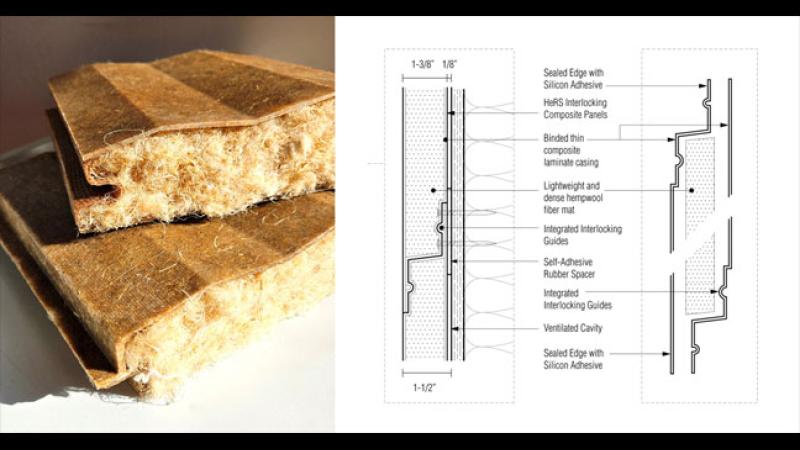Sustainably improving energy efficiency subject of multi-year federal DOE grant
March 14, 2024

Researchers from Rensselaer Polytechnic Institute (RPI) will use hemp to develop a commercially viable, durable, and low-embodied-carbon insulated siding product to address what the U.S. Green Building Council says is a “crucial need for building retrofits to improve energy efficiency and reduce carbon emissions.”
The three-year, $1.5 million award given as part of the Buildings Energy Efficiency Frontiers and Innovation Technologies (BENEFIT) funding opportunity from the United States Department of Energy (DOE) will support RPI faculty and industry partners in creating Hemp Retrofit Structural Insulated Panel (HeRS), a hemp-based insulated siding system that is designed to lower heating and cooling costs for homeowners, is easy for professionals to install, and will reduce the carbon footprint of the built environment.
“Hemp can revolutionize manufacturing in the United States,” said Alexandros Tsamis, the associate director of the Center for Architecture, Science and Ecology (CASE) at RPI and the lead primary investigator (PI) on this project. “By utilizing this versatile and renewable crop in building materials, we can create a building retrofit product that will not only be beneficial for homeowners and the environment but also has the potential to jumpstart regional circular economies throughout the United States based on renewable materials.”
Residential buildings account for 60% of the total built surface area, with over two-thirds of them being single-family homes. To address the need to find a sustainable, cost-efficient, and durable siding solution to insulate existing buildings, the researchers will develop a hemp-based structural insulated panel (SIP) for retrofit applications. HeRS will use a dense mat of hemp wool fibers bonded with a recycled binder that has a similar form factor and attachment method to existing siding materials to promote adoption by builders. It will have a minimum R-5 thermal performance to reduce heating, ventilation, and air conditioning (HVAC) energy use by 15%-25%.
Part of the Seed to City hemp initiative at RPI, the hemp siding stems from previous research from Tsamis and Daniel Walczyk, a professor of mechanical engineering, on the use of natural fibers as a resource for sustainable construction, such as hemp in rebar.
In addition to creating the design and manufacturing plans for HeRS, Hakan Hekimoglu, Ed Palermo, Walczyk, and Arta Yazdanseta, all faculty at Rensselaer and co-PIs on the project, will also analyze the embodied carbon footprint of hemp siding, and conduct a viability study for supply chains that will demonstrate how quantities of hemp fiber produced in the United States can be effectively integrated into the production line of HeRS.
HeRS will also leverage the expertise of industry leaders Durasip, Hempitecture, and Introba to innovate and drive the cost-effective deployment of this clean energy technology.
The BENEFIT funding opportunity from the DOE supports the government-wide approach to the climate crisis by helping buildings to improve their energy efficiency and demand flexibility in a cost-effective and equitable manner. The winning projects were chosen through a competitive selection process that rigorously evaluated applications on their technical merit.
The award is issued through the DOE’s Office of Energy Efficiency and Renewable Energy, which has a mission to accelerate the research, development, demonstration, and deployment of technologies and solutions to equitably transition America to net-zero greenhouse gas emissions economy-wide by no later than 2050, and ensure the clean energy economy benefits all Americans, creating good paying jobs for the American people—especially workers and communities impacted by the energy transition and those historically underserved by the energy system and overburdened by pollution.